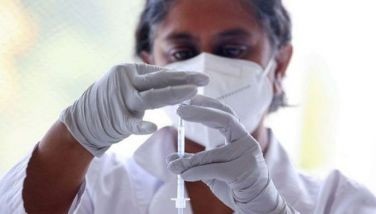Japan's ruling coalition wins big in elections
TOKYO (UPDATED) — Japan's ruling coalition won a solid victory in lower house elections Sunday, giving Prime Minister Shinzo Abe's Liberal Democrats up to four more years to pursue a wide range of economic and political reforms.
The conservative Liberal Democratic Party, which has ruled for most of the post-World War II era, locked up a solid majority of 291 seats and with its coalition partner, the Buddhist-backed Komei party, will hold more than two-thirds of the House of Representatives, national broadcaster reported.
Abe said his top priority was the economy, which fell back into recession after a tax hike in April. "Economy first," he told national broadcaster NHK, adding that he would also tackle other major issues, including national security.
That could help reassure businesses worried over prospects for a recovery.
The central bank's quarterly survey of business sentiment, or "tankan," released Monday showed a slight deterioration in expectations, with manufacturers anticipating weak demand both at home and abroad, and rising production costs.
The U.S. government hopes Abe will be able to win passage of a series of bills needed to expand Japan's military role, so that it can play a bigger part in their alliance. A heated debate is expected when parliament takes up the legislation, likely after local elections in April.
With most of the votes counted, the ruling coalition claimed 326 seats, with the Liberal Democrats' 291 and 35 for the Komei party, according to NHK. The main opposition party, the Democratic Party of Japan, had about 73 seats — a stronger showing than many had expected.
The Japan Communist Party won 21 seats and another opposition party, the Innovation Party, took 41 seats, NHK reported.
The Liberal Democrats held 295 seats before the election, and fell short of the forecasts of many analysts who expected them to win as many as 320 seats.
But the victory allows Abe as long as another four years to pursue his agenda, including economic reforms, nuclear plant restarts and his long-term goal of revising Japan's constitution. But opposition from vested interests and sizeable segments of the public could still stymie his plans.
"I believe the results show that we have received a public mandate for the Abe administration's achievement over the past two years," Abe said in a live television interview with Tokyo Broadcasting System. "But we should not be complacent about the results."
Abe, who took office two years ago, called Sunday's snap election last month, saying he wanted a renewed assessment of his economic revitalization program, known as Abenomics.
Share prices have risen and many companies have reported record profits, but wages have failed to keep pace with inflation and slack demand is discouraging business investments needed to spur faster growth.
"I believe this shows that voters gave the Abe administration a positive evaluation over the past two years," said Finance Minister Taro Aso, who retained his seat in parliament. "Abenomics is still halfway through, and I feel a strong sense of responsibility to push it further."
In Washington, the White House congratulated Abe on his election victory, calling the U.S.-Japan alliance "the cornerstone of peace and prosperity in the Asia-Pacific." The White House statement expressed appreciation for Abe's "strong leadership" on a wide range of issues from typhoon relief in the Philippines to the Ebola response and the international fight against the Islamic State group.
Abe's win reflects less his own popularity than public disappointment in the lack of a viable opposition party. The Democratic Party of Japan lost power in 2012 after three years in office, struggling in the aftermath of the 2011 earthquake, tsunami and nuclear disasters and failing to deliver on campaign promises.
Abe's agenda includes labor market reforms and securing a trans-Pacific trade agreement that is strongly opposed by the powerful farm and medical lobbies.
He also hopes to begin restarting some of Japan's nuclear power plants, despite continued public concerns after the meltdowns at the Fukushima Dai-ichi plant following the 2011 earthquake and tsunami.
Kyodo news agency estimated voter turnout at 52.7 percent, a post-World War II record low and down 7 percentage points from the previous lower house election in 2012.
- Latest
- Trending




























